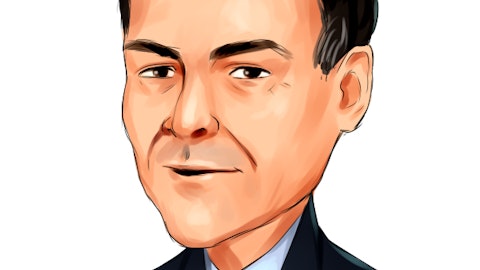
Exxon Mobil Corporation (XOM) is a major integrated oil and gas company with a $408.00 billion market cap. It is currently priced at 10.26 times its earnings. XOM pays a 2.21% dividend yield and has a 21.96% payout ratio. Analysts give it a 2.2 on a scale from 1.0, meaning “Strong Buy,” and 5.0, meaning “Sell.” The company has a 0.51 beta and recently traded for $85.12 a share. Ken Fisher’s Fisher Asset Management had $518.97 million in XOM at the end of the third quarter, while Phill Gross and Robert Atchinson’s Adage Capital Management had $497.18 million in the company at the end of September.
Chevron Corporation (CVX) is a major integrated oil and gas company with a $215.70 billion market cap. It is currently priced at 8.03 times its earnings. CVX pays a 2.99% dividend yield and has a 22.20% payout ratio. Analysts give it a 1.9 on a scale from 1.0, meaning “Strong Buy,” and 5.0, meaning “Sell.” The company has a 0.80 beta and recently traded for $108.31 a share. Phill Gross and Robert Atchinson’s Adage Capital Management had $266.89 million in CVX at the end of the third quarter. Bill Miller’s Legg Mason Capital Management and Cliff Asness’ Aqr Capital Management were also fans of the company.
Microsoft Corporation (MSFT) is an application software company with a $236.42 billion market cap. It is currently priced at 10.22 times its earnings. MSFT pays a 2.85% dividend yield and has a 24.37% payout ratio. Analysts give it a 2.1 on a scale from 1.0, meaning “Strong Buy,” and 5.0, meaning “Sell.” The company has a 0.99 beta and recently traded for $28.10 a share. Boykin Curry’s Eagle Capital Management had $494.86 million in MSFT after increasing its stake in the company by +4%. Jean-Marie Eveillard’s First Eagle Investment Management, Ken Fisher’s Fisher Asset Management and David Einhorn’s Greenlight Capital also had significant stakes in MSFT at the end of the third quarter.
Wal-Mart Stores, Inc. (WMT) is a discount department store with a $202.06 billion market cap. It is currently priced at 13.29 times its earnings. WMT pays a 2.47% dividend yield and has a 31.11% payout ratio. Analysts give it a 2.3 on a scale from 1.0, meaning “Strong Buy,” and 5.0, meaning “Sell.” The company has a 0.35 beta and recently traded for $59 a share. Warren Buffett’s Berkshire Hathaway had $2.03 billion in WMT at the end of the third quarter, while Boykin Curry’s Eagle Capital Managementowned a stake worth $479.72 million at the end of September.
The Coca-Cola Company (KO) is a non-alcoholic beverage company with a $156.56 billion market cap. It is currently priced at 12.69 times its earnings. KO pays a 2.73% dividend yield and has a 33.32% payout ratio. Analysts give it a 1.7 on a scale from 1.0, meaning “Strong Buy,” and 5.0, meaning “Sell.” The company has a 0.55 beta and recently traded for $68.93 a share. Warren Buffett’s Berkshire Hathaway had $13.51 billion in KO during the third quarter. Paul Ruddock’s Lansdowne Partners and Boykin Curry’s Eagle Capital Management are also fans of the company.
McDonald’s Corp. (MCD) is a fast food restaurant company with a $102.94 billion market cap. It is currently priced at 19.73 times its earnings. MCD pays a 2.78% dividend yield and has a 47.27% payout ratio. Analysts give it a 2.0 on a scale from 1.0, meaning “Strong Buy,” and 5.0, meaning “Sell.” The company has a 0.46 beta and recently traded for $100.60 a share. Jim Simons’ Renaissance Technologies had $270.53 million in MCD at the end of September after increasing its stake in the company by +25% during the third quarter.
Procter & Gamble Co. (PG) is a personal products company with a $182.58 billion market cap. It is currently priced at 16.84 times its earnings. PG pays a 3.16% dividend yield and has a 48.59% payout ratio. Analysts give it a 1.8 on a scale from 1.0, meaning “Strong Buy,” and 5.0, meaning “Sell.” The company has a 0.45 beta and recently traded for $66.36 a share. Warren Buffett’s Berkshire Hathaway had more than 8% of its portfolio invested in PG at the end of the third quarter, in a position worth $4.85 billion. Ken Fisher’s Fisher Asset Management was also a fan.
Pepsico, Inc. (PEP) is a non-alcoholic beverage company with a $102.23 billion market cap. It is currently priced at 16.39 times its earnings. PEP pays a 3.15% dividend yield and has a 49.27% payout ratio. Analysts give it a 2.3 on a scale from 1.0, meaning “Strong Buy,” and 5.0, meaning “Sell.” The company has a 0.52 beta and recently traded for $65.39 a share. Boykin Curry’s Eagle Capital Management had $338.14 million in PEP after upping its holding in the company by +4% during the third quarter. Ric Dillon’s Diamond Hill Capital was also a fan.





